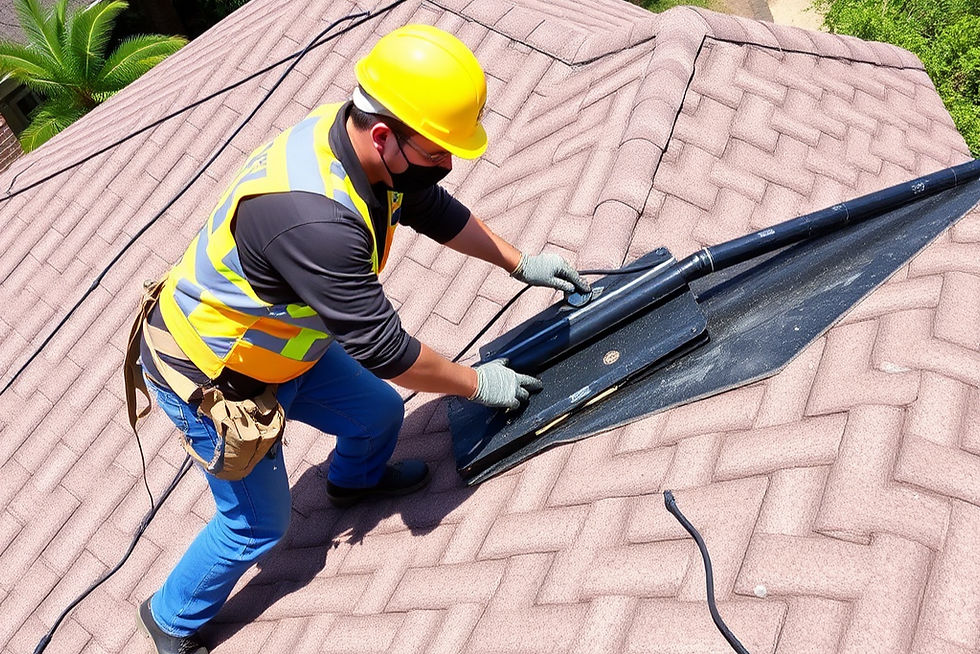The Benefits and Long-Term Effects of Termite Control: A Comprehensive Analysis
- Lauren Bracy
- Oct 10, 2024
- 4 min read
Termites are a quiet, yet ominous trespasser in our homes, often detected only when the damage done is considerable. This blog post will examine the long-term effects and the innumerable benefits of investing in termite control. We ought to ask ourselves - how does termite control ensure the structural longevity of our homes? Why do homeowners shirk termite control, and what are the potential consequences of this negligence? With an aim to educate and inform, this blog post will dissect the practice of termite control and explore its long-term implications.
Termite control is invariably an essential aspect of maintaining any property. It's easy to overlook small signs of termite invasion, often leading to irreversible damages. Why should home maintenance strategies include a thorough termite control program and thus aid in preventing such catastrophes? This post discusses answers to such poignant questions while providing insightful tips on termite proofing your homes for years to come.
This deep dive into the subject matter of termite control is intended to bridge the gap between informal discussion and academic discourse, providing you with a comprehensive understanding of the topic. As we navigate the various facets of this issue, we will investigate techniques of termite control, discuss its long-term implications, and understand the cost-effectiveness of these interventions.
The Science of Termites: An Invasion Unseen

In order to appreciate the importance of termite control, we first need to understand the science behind their presence. Termites are incredibly resilient creatures that have roamed the Earth for hundreds of millions of years, thriving by devouring cellulose-based plant material, commonly found in wood. While they play a crucial role in the ecosystem, they can become a nightmare for homeowners when their wood cravings turn towards the structure of our homes.
Termites work tirelessly, wreaking havoc on a property without notable signs until the damage becomes substantial. Their highly organized colonies operate in a hidden world within walls, ceilings, and floors, often escaping detection until it's too late. By understanding their biology and behavioral patterns, we can devise strategies to intercept and combat them, a key focus of termite control.
The termites' silent eating habits spell disaster for the unprepared homeowner. To protect our homes from the relentless jaws of these tiny invaders, we have to think preemptively and invest wisely in termite control. With efficient termite control, the home remains safeguarded, and the longevity of the property is preserved, a boon hard to ignore.
The Importance of Termite Control for Your Home
Termite control guarantees the safety of your home's investment. But why is it so crucial? One reason is the sheer destructiveness of these pests. They can weaken the structural integrity of your property, posing potential risks. The subsequent repairs can cost thousands of dollars, a needless expenditure had the termites been dealt with at the outset.
Additionally, termites reproduce rapidly, multiplying their damaging effects. If left unchecked, a small infestation can quickly snowball into a multitude of colonies, extending their reach across vast areas of your property. By investing in termite control, you nip the problem in the bud, preventing widespread damage.
Lastly, homes with a history of termite infestation may lack appeal to potential buyers. It implies a risk of recurrent infestations, depreciating the property value. Ensure that your home remains an attractive prospect with timely termite control.
The Long-Term Benefits of Termite Control
Among the several benefits of termite control, the preservation of the home's structural integrity tops the list. The structural strength of the property is preserved, rendering the property safe for a long time.
Moreover, the aesthetic appeal of the home is maintained. Incredible Vintage furniture, hardwood floorings or wooden artifacts that could potentially be destroyed by termite carnage are preserved in all their glory.
Lastly, the monetary benefit of termite control cannot be overstated. The savings from avoiding costly repairs far outweigh the initial investment made in termite control systems and services.
Misconceptions About Termite Control

While it's universally accepted that termite control is important, some common misconceptions deter homeowners from considering it. For instance, some think that modern, well-constructed homes are impervious to termites, which is a fallacy. Termites can invade and damage any property, regardless of its age or construction quality.
Another belief is that termite control is excessively expensive and unnecessary unless there is a visible infestation. This reactive approach can prove costly in the long run. Prevention is considerably more cost-effective than extensive repairs. Termite control pays for itself over time in prevention of damage.
Conclusion
Termite control is a necessary investment in home maintenance, offering protective benefits that extend beyond just material preservation. It ensures a home that stays beautiful, a structure that remains strong, an investment that maintains value, and a peace of mind for the homeowner. The negative implications of neglecting this crucial practice range from costly repairs to immense property devaluation.
To debunk popular misconceptions, termite control is not a luxury but an essential investment. No property, however well-constructed, is immune to the destruction termites can unleash. Additionally, the cost of termite control is an expenditure that proves itself worthwhile by preventing far more costly damage repairs.
In the long-term perspective, termite control provides an invaluable shield to your home, preserving both its structural and aesthetic integrity. Taking a proactive approach to termite control is clearly a smart, cost-effective strategy for every homeowner.





Comments